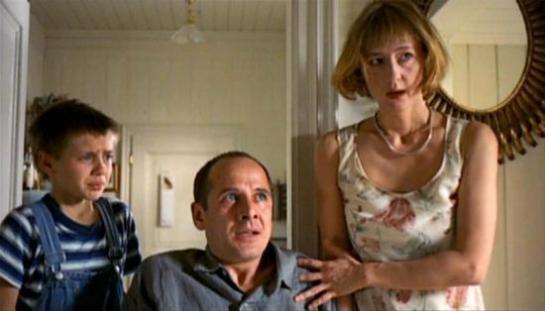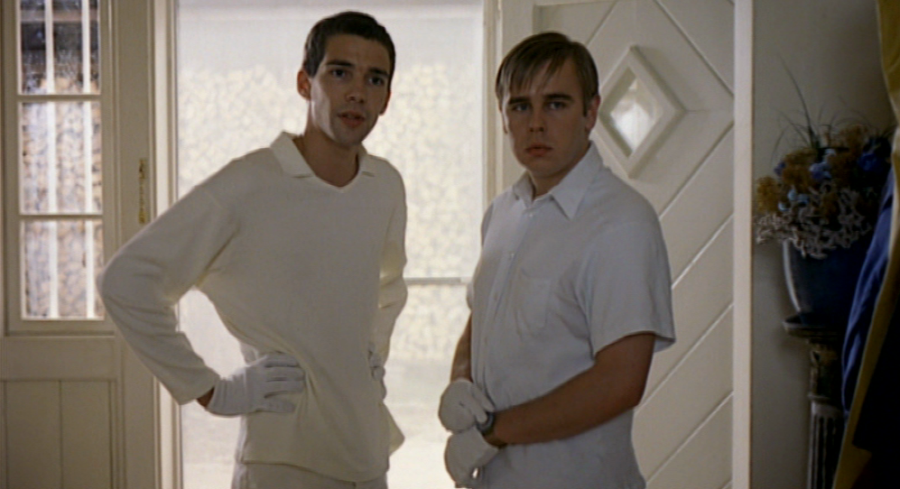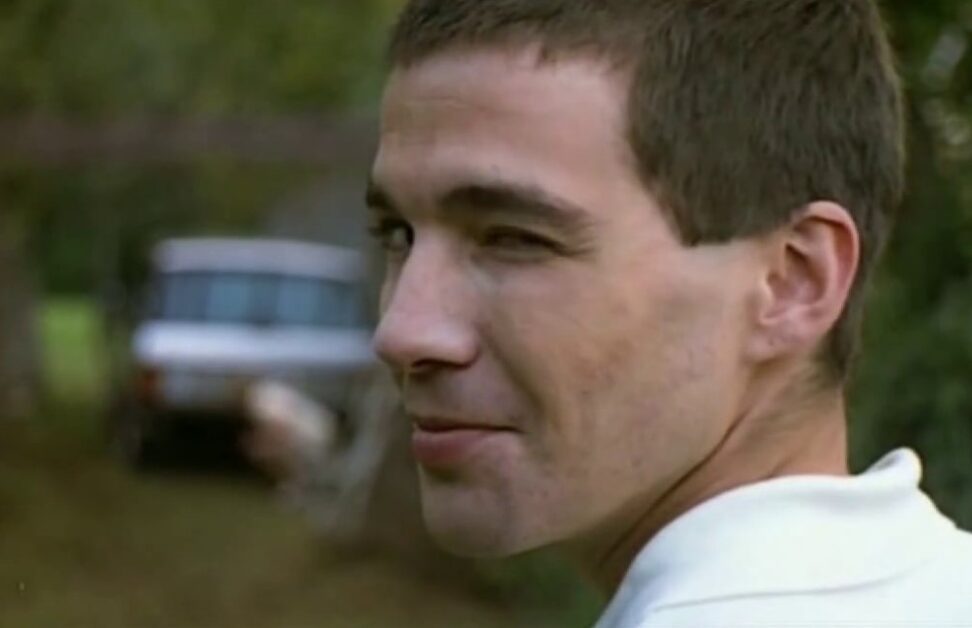Haneke is uninterested in conventional horror, but rather uses the medium of the genre film to make a larger point about how we, as an audience, consume violence and violent images. Haneke isn’t subtle or allegorical on this point. Even the title of the film, Funny Games, implies that horror audiences are entertained – albeit delighted – by what we see on the screen before us. It’s only fitting that the film was originally released in German, as it actively and enthusiastically follows the tradition of Bertolt Brecht. The fourth wall, the barrier between audience and drama, is obliterated with the opening credits of Funny Games. That obliteration takes the form of the white knuckle thrash metal audio-violence of the song “Bonehead” by the band Naked City.
The family, driving their car to their idyllic lake house, are playing a guessing game with opera CDs and the car stereo. Right as the audience and the family are lulled into safety, “Bonehead” blares and the blocky, ballistic title card “FUNNY GAMES” blasts onto the screen. We are assaulted; the family is unaware. Haneke announces, in no uncertain terms, that we are watching a movie.

Thankfully, though, it is a movie acted brilliantly by a truly gifted cast. The family unit is realistic, likable, and familiar even with the rough, touch-and-go language barrier of German between them and us. The mother, played flawlessly by Susanne Lothar, communicates the frustrations and joys of being a mom with just a single smile or laugh. The father, played by Ulrich Mühe, upholds conventional depictions of father figures with a vulnerability and gruffness that makes me want to call my own dad. Finally, it’s a small and perfect miracle that Haneke found a child actor that does not make me close my eyes and wish for a world without children (in the way most child actors do).
The family’s thoughtful and inquisitive son, Schorschi (Stefan Clapczynski), gives the film an entirely new dimension. During filming, Lothar and Mühe were a couple in real life, further expanding the realism and giving the viewer more reason to suspend their disbelief to buy whole-hog into the notion that this is a real family. That grounded portrayal of the family, before the violence to come, is what makes Haneke’s film possible. If there is to be a subversion of the genre, none of it can happen without a family and a world we believe in first.

Shortly after the music-as-violence opening credit sequence, the real brutality begins when two young men (played pitch-perfectly by Arno Frisch and Frank Giering) enter the family home and methodically, brutally, go about the business of dismantling a family. For example, in one horrifying scene, the mother is forced to strip naked in a game the villainous pair call “Cat In the Bag.”
I call attention to this scene, not for titillation, but because it’s one of immense stylistic importance to the film. When she strips, we are not shown her body; we are shown her face. Haneke knows he is making an exploitation film, but he wants us to know exactly what he’s exploiting for our entertainment. He’s showing us human suffering. Our entertainment is pain. Haneke wants us to think about why we value the simulation of torture, violence, and misery.

This question is buttressed by several more forced disruptions to the fourth wall. The villainous pair routinely ask the audience for their input. They unabashedly wink and nod and smile right at us. Funny Games is a mean, bitter, thoughtful bully of a movie and it feels more painful than entertaining. Haneke knows this, and, in the midst of his high-minded investigation of violence and voyeurism, also manages to create a perfectly paced and expertly choreographed, quintessential home invasion film.
Haneke understands that the audience must be spoken to in their language as well as his. The point of the film never dissolves or becomes confused. Funny Games proves definitively that movies can do more than entertain us. Movies can teach us something, even leave us with a question that will inform the way we watch every movie from that point forward.
In that dark theater with only me to watch it, Funny Games shifted my entire worldview. It changed the way I see horror. I no longer fear the masked killer, the rabid animal, or the vampire. Michael Haneke, in no uncertain terms, whispered the darkest secret of the genre into my ear with this film. All the nightmares of horror cinema, all the stabbings and bites and blood and guts, exist for a single purpose: because we asked for them. We are the bad guys, egging on these dark dreams until we have seen enough pain to go home happy.
 PopHorror Let's Get Scared
PopHorror Let's Get Scared



